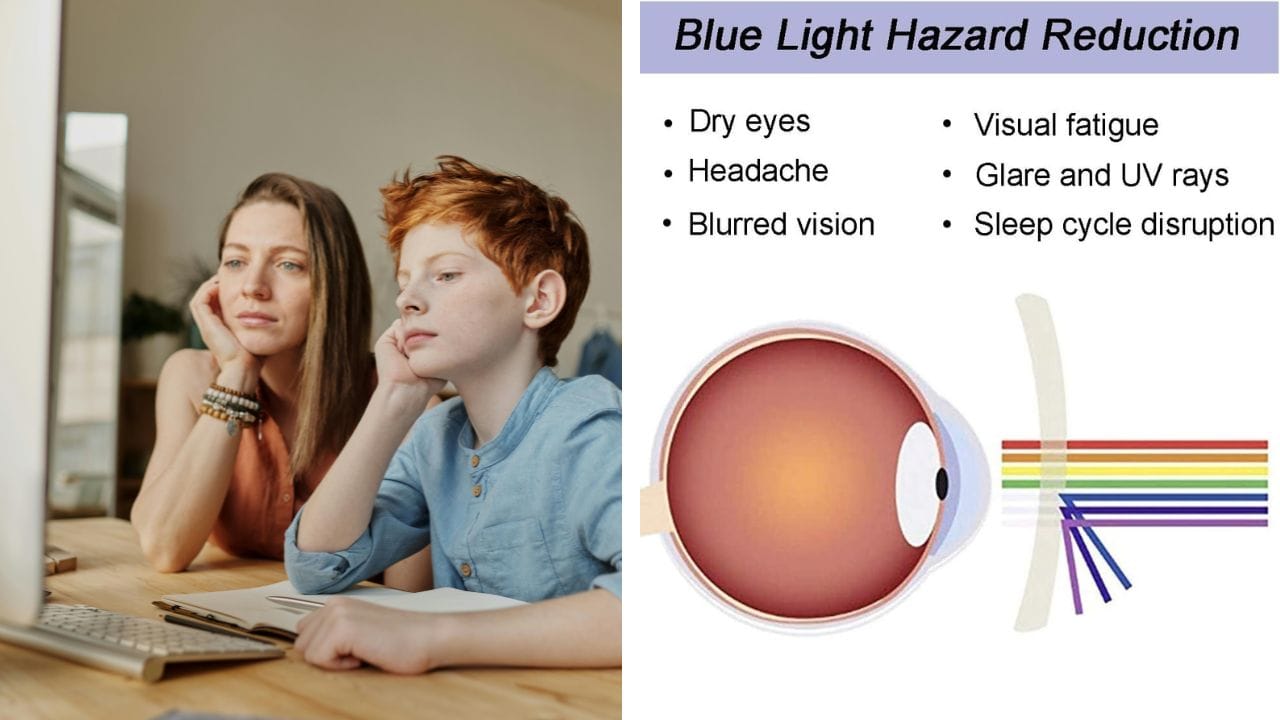The Impact of Blue Light on Children's Eyes: Separating Fact from Fiction
Ongoing research suggests that prolonged exposure to blue light may not directly cause permanent harm to children's eyes.

In the digital age, screens are an inescapable part of our lives, and the eyes of our children are increasingly exposed to the glow of digital devices. As parents and caregivers, it's natural to worry about the potential harm this exposure could cause, particularly when it comes to the mysterious blue light emitted by these screens. This article will delve into the science behind blue light, its effects on children's eyes, and whether there is cause for concern about permanent damage.
Key Takeaways:
- Understand what blue light is and how it affects the human eye.
- Learn about the current research on blue light exposure and children's eye health.
- Discover practical ways to protect children's eyes from potential blue light harm.
What is Blue Light and Why Should We Care?
Blue light is a color in the visible light spectrum that can be seen by the human eye. It has a short wavelength, which means it produces higher amounts of energy. Sources of blue light include the sun, digital screens, LED lighting, and fluorescent lighting. While blue light from the sun is natural and helps regulate our sleep and wake cycles, the concern arises from the artificial sources that we are exposed to for prolonged periods, especially in children whose eyes are still developing.
The Science Behind Blue Light and Vision
The human eye is not very efficient at blocking blue light. Almost all visible blue light passes through the cornea and lens and reaches the retina, which is the light-sensitive part of the eye. Overexposure to blue light has been suggested to cause eye strain and discomfort, and there is ongoing research into whether it could potentially lead to more serious conditions like macular degeneration over time.
Blue Light and Children's Developing Eyes
Children's eyes absorb more blue light than adults from digital device screens, which could potentially lead to changes in the eye's structure and function. The lens of a child's eye is more transparent than that of an adult, allowing more blue light to penetrate directly to the retina which is crucial for vision.
Research on Blue Light Exposure in Children
Current research indicates that while short-term exposure to blue light from screens is unlikely to cause significant damage to children's eyes, the long-term effects are still not fully understood. Studies are ongoing to determine if there is a link between prolonged exposure during childhood and future eye health issues.
Symptoms of Blue Light Overexposure in Children
Symptoms that may indicate overexposure to blue light in children include complaints of eye strain, headaches, and disrupted sleep patterns. These symptoms are often grouped under the term 'digital eye strain' or 'computer vision syndrome,' which can also include dry eyes and blurred vision.
Digital Eye Strain: A Growing Concern
With the increase in virtual learning and screen time for entertainment, digital eye strain has become a more common issue among children. It's important for parents to recognize the signs and take steps to minimize their children's discomfort.
Can Blue Light Cause Permanent Damage?
The question of whether blue light can cause permanent damage to children's eyes is a complex one. While there is no conclusive evidence at this time that blue light leads to permanent eye damage, the lack of long-term data means that we should still be cautious about excessive exposure.
The Precautionary Principle in Blue Light Exposure
Given the uncertainty surrounding the long-term effects of blue light on children's eyes, it is wise to apply the precautionary principle. This means taking proactive steps to protect children's eyes even in the absence of definitive evidence of harm.
Blue Light Protection Glasses: Do They Work?
Blue light protection glasses are designed to filter out blue light from screens. These glasses have special coatings that are supposed to block or absorb blue light, potentially reducing eye strain and improving sleep quality.
The Verdict on Blue Light Glasses for Kids
While some parents report that blue light glasses have made a difference for their children, scientific evidence supporting their effectiveness is still emerging. It's important to consider other factors that contribute to eye strain and overall eye health as well.
Setting Healthy Screen Time Habits
Establishing healthy screen time habits is crucial for protecting children's eyes. This includes taking regular breaks using the 20-20-20 rule (every 20 minutes, look at something 20 feet away for at least 20 seconds), ensuring proper lighting, and adjusting screen brightness and contrast.
The Role of Parents and Guardians
Parents and guardians play a key role in monitoring and managing their children's screen time. Encouraging outdoor play and activities that do not involve screens can also help mitigate the potential risks associated with blue light exposure.
Other Ways to Protect Your Child's Eyes
In addition to considering blue light protection glasses, there are other measures that can be taken to protect children's eyes. These include reducing screen brightness, using screen filters, and encouraging children to take frequent breaks to focus on distant objects.
The Importance of Regular Eye Exams
Regular eye exams are essential for monitoring children's eye health. An optometrist can provide personalized advice on protecting against blue light and other factors that could impact vision.
The Impact of Blue Light on Children's Eyes
The debate over blue light and its potential effects on children's eyes is ongoing. While there is no concrete evidence that blue light causes permanent damage, the symptoms of overexposure and the lack of long-term data suggest that caution is warranted. By staying informed and proactive, we can help safeguard our children's vision.
While blue light protection glasses can provide certain advantages, they should complement a comprehensive approach that emphasizes healthy screen practices and routine eye care. To explore whether blue light protection glasses could benefit your child, click the button below to view our selection.

